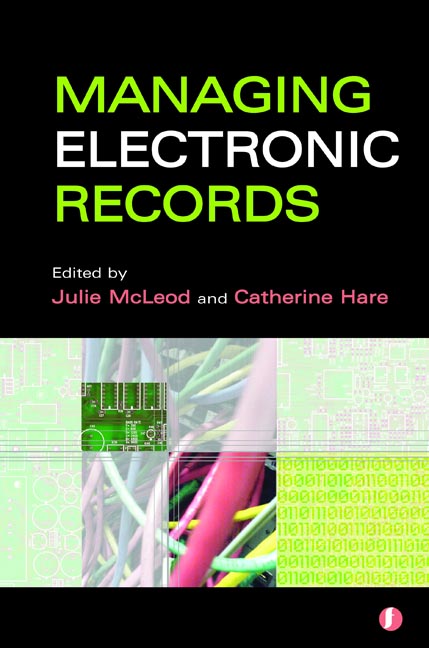Book contents
- Frontmatter
- Contents
- The editors and contributors
- Preface
- 1 The wild frontier ten years on
- 2 The use of standards and models
- 3 Metadata matters
- 4 Digital preservation – ‘the beautiful promise’
- 5 Research in electronic records management
- 6 Technologies for preservation
- 7 Legal issues
- 8 Ethics and electronic recordmaking
- 9 Competencies – the asset that counts most: on developing human talents as a prerequisite for successful EDRM changes
- 10 Records management: two case studies from the French private sector
- 11 Implementing a solution for electronic recordkeeping in the public sector
- 12 Playing the long game – creating and maintaining the links in the value chain
- Index
9 - Competencies – the asset that counts most: on developing human talents as a prerequisite for successful EDRM changes
Published online by Cambridge University Press: 08 June 2018
- Frontmatter
- Contents
- The editors and contributors
- Preface
- 1 The wild frontier ten years on
- 2 The use of standards and models
- 3 Metadata matters
- 4 Digital preservation – ‘the beautiful promise’
- 5 Research in electronic records management
- 6 Technologies for preservation
- 7 Legal issues
- 8 Ethics and electronic recordmaking
- 9 Competencies – the asset that counts most: on developing human talents as a prerequisite for successful EDRM changes
- 10 Records management: two case studies from the French private sector
- 11 Implementing a solution for electronic recordkeeping in the public sector
- 12 Playing the long game – creating and maintaining the links in the value chain
- Index
Summary
Introduction
Thinking about training, education, staffing or competencies in an electronic document and records management (EDRM) context has one advantage: there are no standard requirements available on this specific item. Model Requirements for the Management of Electronic Records (MoReq) does not mention terms like education, staff, professionalism, competencies or qualification. There are no relevant statements about the issue in the DoD 5015.2 standard. In fact only the ISO 15489 standard and the ERPANET toolset say something in general terms on training.1 Is this really an advantage? Or is it a tacit assumption that moving organizations towards these standards can be safely laid in the hands of competent professionals?
Deliberate actions in the domain of human resource management (HRM) are required to develop further the competencies of records management staff who are responsible for implementing organizational change in the context of installing an EDRM system. Change management demands change managers and likewise transforming traditional recordkeeping towards EDRM demands transforming records managers. How should these transformations be managed?
This chapter sketches out a way of dealing with human resource development (HRD) in an EDRM context. Taking my activities as a consultant in EDRM implementation projects as a starting point, I will share some points of knowledge and instruments that I have acquired and tested in my work. I will give a personal view of lessons learned, based on experience and reflection.
HRD matters should not be situated at the end of the bid-and-buy cycle of an EDRM system – which is too often the case. The supplier of course offers some kind of training to support the effective use of the new system. At its best such skills training has very restricted operational objectives (‘how to …’). It mostly lacks variety in pedagogic formats (it is unidirectional, teacher driven) and pays little attention to differences in learning styles and to the transfer of learning into practice. Training should not be at the bottom of the list.
Instead, learning would be better at the very heart of the innovation itself. In fact innovation means change, changing equates to learning, and learning is the core of HRD. I will consider here the process of innovation in record keeping – for example, the implementation of an EDRM system – as an excellent chance for continuous professional development (CPD) of all those who are involved.
- Type
- Chapter
- Information
- Managing Electronic Records , pp. 129 - 148Publisher: FacetPrint publication year: 2005
- 2
- Cited by



